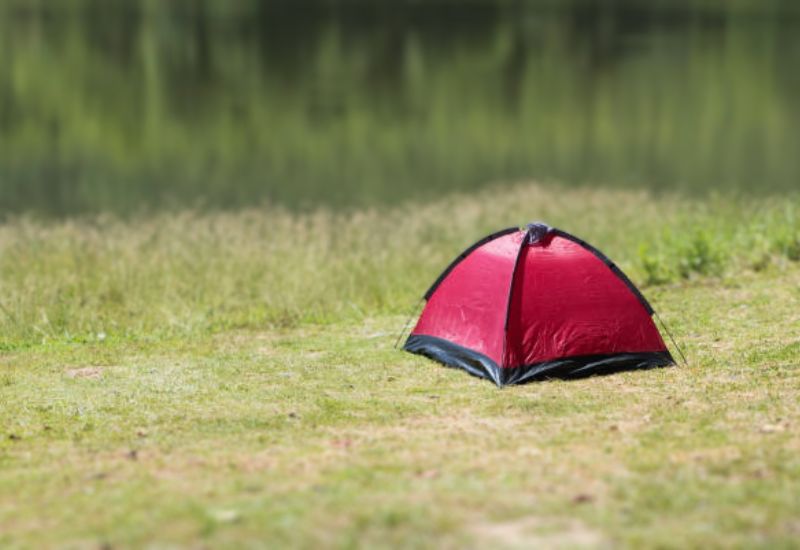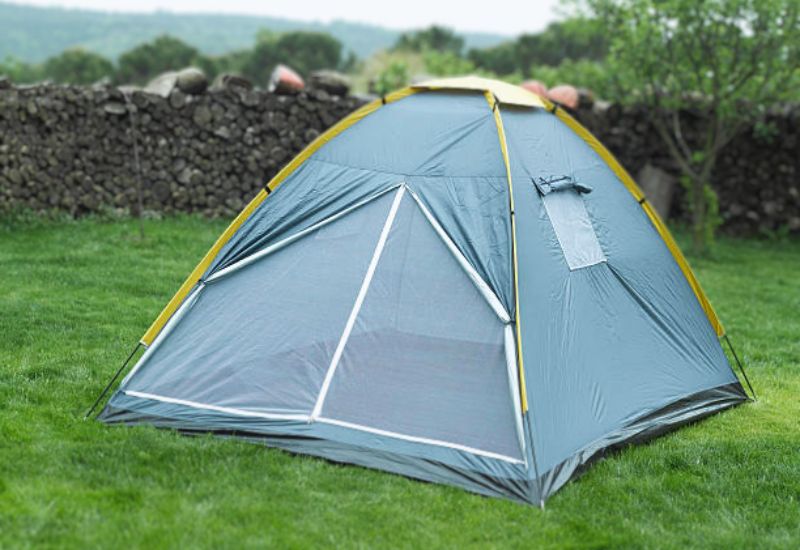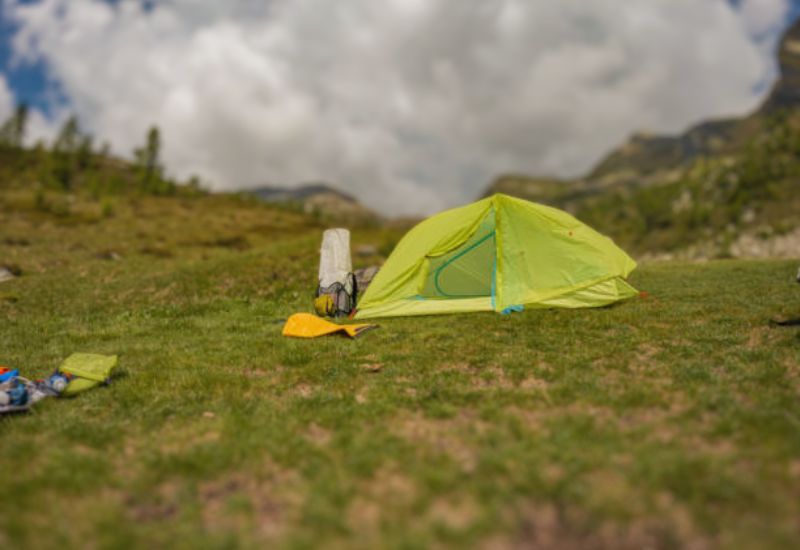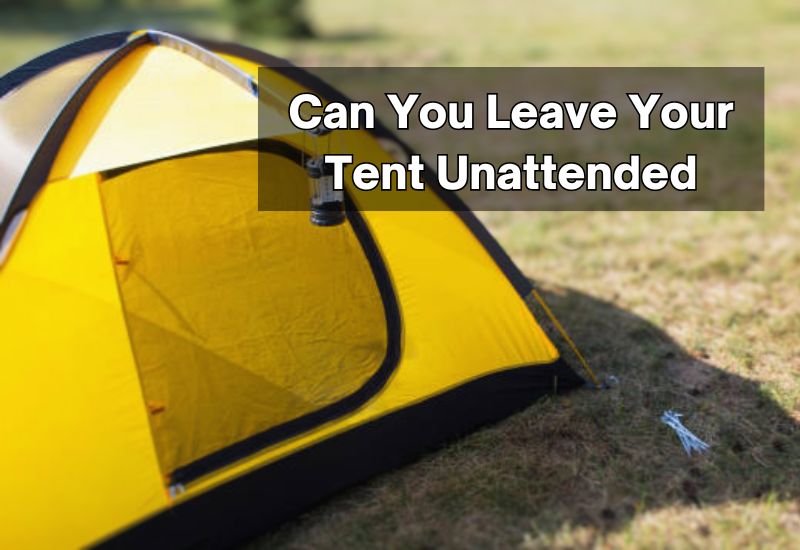Leaving your tent unattended while camping can be risky. Factors such as weather, wildlife, and potential theft can impact the safety of your belongings and the integrity of your tent.
Can You Leave Your Tent Unattended? Leaving your tent unattended can be risky. Always secure your valuables, use a lock, and inform camp neighbors or staff. Taking these steps helps minimize potential issues.
Understanding the potential risks and taking appropriate precautions can help you decide when it’s safe to leave your tent unattended.
Is It Safe to Leave Your Tent?
When camping, ensuring the safety of your tent is crucial. Here are some important points to consider to keep your campsite secure and enjoy a worry-free experience.
Evaluate Campsite Security:
Before setting up your tent, check the security measures of the campsite. Look for:
- Fenced areas or gated entrances.
- Presence of security personnel.
- Clear signage indicating private property.
These factors can significantly reduce the risks of leaving your tent unattended.
Choose a Well-Lit Campsite:
A well-lit campsite can deter potential thieves and wildlife. Ensure your campsite has:
- Adequate lighting around the tent area.
- Nearby lampposts or campfire spots.
- Visibility from common areas or pathways.
Good lighting is a simple yet effective way to enhance your tent’s safety.
Consider Environmental Factors:
The surrounding environment plays a big role in your tent’s safety. Avoid setting up near:
- Water bodies prone to rising levels.
- Steep hills or rocky terrains.
- Dense forests with potential wildlife threats.
Choosing a secure area ensures that you and your tent stay safe.
Be Aware of Potential Threats:
Understanding potential threats helps you prepare better. Common threats include:
- Wildlife: Raccoons, bears, or rodents.
- Weather: Storms, heavy rain, or strong winds.
- Theft: Opportunistic campers or passersby.
Being aware of these threats allows you to take preventive measures.
Keep Valuables Secure:
Never leave valuable items in your tent. Instead, consider:
- Using a portable safe or lockbox.
- Storing valuables in your vehicle.
- Keeping essential items like wallets and phones with you.
This reduces the risk of theft and loss.
Inform Fellow Campers:
Build a sense of community by informing fellow campers about your absence. They can:
- Keep an eye on your tent.
- Inform you of any suspicious activity.
- Help in case of emergencies.
Friendly communication enhances overall campsite security.
Lock Your Tent:
Using a lock on your tent’s zipper can deter potential intruders. While it won’t stop a determined thief, it adds an extra layer of security. Always:
- Use a sturdy, weather-resistant lock.
- Secure all entry points of your tent.
- Check the lock periodically.
Security Measures for Unattended Tents

Camping is a wonderful way to connect with nature, but leaving your tent unattended can make your belongings vulnerable. Implementing security measures can protect your tent and belongings.
Use high-quality locks, secure zippers, and consider a small, portable alarm system. These measures can deter thieves and provide peace of mind when you need to leave your tent.
Use Locks and Secure Zippers:
Using locks and securing zippers is a simple yet effective way to enhance tent security. Here’s how:
- High-Quality Locks: Invest in sturdy, weather-resistant locks for your tent.
- Secure Zippers: Make sure zippers are strong and lockable to prevent easy access.
- Double Zipping: Use two zippers that can be locked together for added security.
Portable Alarm Systems:
A portable alarm system can significantly boost your tent’s security. Here’s why:
- Easy to Install: Most portable alarms are easy to set up and don’t require any technical skills.
- Loud Alarm: They emit a loud noise when triggered, scaring off potential thieves.
- Compact: These alarms are small and easy to carry, making them ideal for camping trips.
Deter Thieves:
Taking steps to deter thieves can help keep your belongings safe:
- Visible Security: Display security measures to make your tent less appealing to thieves.
- Camp in Groups: Setting up your tent near others can discourage theft.
- Leave Valuables at Home: Only bring necessary items to reduce the risk of loss.
Camp Near Others:
Camping near others can provide additional security:
- Safety in Numbers: Thieves are less likely to target areas with many people.
- Watchful Eyes: Fellow campers can help keep an eye on your belongings.
- Community Support: Being part of a camping community can provide extra security.
Keep Your Valuables Hidden:
Keeping your valuables hidden is crucial:
- Use a Secure Bag: Store valuables in a lockable bag.
- Hide Inside the Tent: Place items in less obvious spots within your tent.
- Carry Important Items: Take essential items like wallets and keys with you when you leave the tent.
Use Technology for Security:
Utilize technology to enhance your tent security:
- GPS Trackers: Attach GPS trackers to your valuable items.
- Surveillance Cameras: Use portable cameras to monitor your campsite.
- Smart Locks: Consider smart locks that can be controlled via your phone.
Maintain a Low Profile:
Keeping a low profile can help avoid attracting attention:
- Avoid Flashy Items: Don’t bring expensive or flashy items to your campsite.
- Keep a Clean Camp: A well-organized campsite is less inviting to thieves.
- Stay Vigilant: Be aware of your surroundings and report any suspicious activity.
Protecting Valuables Inside Your Tent

Camping is a wonderful adventure, but it’s important to keep your valuables safe. Here are some simple tips to help you protect your belongings while enjoying the great outdoors.
Carry Essential Items with You:
When leaving your tent, always carry essential items like your wallet, phone, and keys with you. This reduces the risk of theft and ensures you have your most important items at all times.
Use Lockable Storage Containers:
- Choose a Sturdy Container: Opt for a lockable storage container made from durable material.
- Keep It Hidden: Place the container in a concealed spot within your tent.
- Lock It Up: Always lock the container, even if you’re only stepping away for a short period.
Conceal Valuables Effectively:
Concealing your valuables is a smart way to prevent theft.
Hide items under sleeping bags or in less obvious places like inside empty food containers. The harder it is for someone to find them, the safer your items will be.
Store Valuables in a Secure Location:
If you have items that are too valuable to risk leaving in your tent, consider using a campsite’s secure storage facilities if available.
Alternatively, you can store items in your car’s trunk, as it provides an extra layer of security.
Use a Portable Safe:
Portable safes are small, lockable boxes that can be attached to fixed objects. They are ideal for storing items like cash, jewelry, and electronics. Here’s how to use one:
- Attach to a Fixed Object: Secure the safe to a tent pole or a nearby tree.
- Lock It: Ensure the safe is locked and the key is kept with you.
- Camouflage: Cover the safe with clothes or other gear to keep it out of sight.
Create the Illusion of Occupancy:
Leaving your tent looking occupied can deter thieves. Spread out personal items and leave a light on at night. This gives the impression that someone is inside, making it less likely for someone to attempt theft.
Keep Valuables Close While Sleeping:
Keep your valuables close to you while you sleep. Place items like wallets and phones in a pouch under your pillow or in a sleeping bag pocket. This keeps them within reach and out of sight from potential thieves.
Tips for Tent Theft Prevention:
- Camp in a Group: There’s safety in numbers. Camping with friends or family can deter thieves.
- Choose a Busy Campsite: Thieves are less likely to target tents in well-populated areas.
- Be Vigilant: Keep an eye out for suspicious activity and report it to campsite authorities.
Weather Concerns for Unattended Tents

Secure Staking and Guy Lines:
Proper staking is essential to prevent your tent from blowing away. Here are some tips:
- Use strong stakes: Invest in durable stakes that can penetrate various ground types.
- Additional guy lines: Attach extra guy lines to secure the tent more effectively.
- Check tension: Regularly check the tension of your stakes and guy lines to ensure they remain taut.
Weather Scenarios to Consider:
Different weather conditions can pose unique challenges for your tent. Here’s what to keep in mind:
- Strong Winds: Use additional guy lines and position your tent behind natural windbreaks.
- Heavy Rain: Ensure your tent has a rainfly and proper ventilation to avoid water buildup.
- Snow: Choose a tent designed for snow if camping in winter conditions to prevent collapse.
Importance of Tent Durability:
A durable tent can make all the difference in extreme weather.
Look for features like reinforced seams and heavy-duty zippers. These elements enhance the overall strength and longevity of your tent, allowing it to withstand repeated use in challenging environments.
Checking the Weather Forecast:
Always check the weather forecast before leaving your tent unattended. This can help you anticipate any potential issues and take necessary precautions.
Knowing what to expect can prevent unpleasant surprises and ensure your tent remains intact while you’re away.
Tips for Camping in Bad Weather:
Camping in bad weather requires extra preparation:
- Pack a repair kit: Include items like duct tape and spare stakes.
- Choose your campsite wisely: Avoid low-lying areas prone to flooding.
- Stay informed: Keep a weather radio or app handy for updates.
Conclusion
Leaving your tent unattended while camping can be risky due to weather, wildlife, and potential theft. To minimize risks, always secure your valuables, use locks, and inform camp neighbors or staff.
Evaluating campsite security, choosing well-lit areas, and understanding environmental factors are essential steps for a safe camping experience.
By taking these precautions, you can enjoy your camping adventure without worrying about your tent and belongings. Remember to stay vigilant and follow safety measures to ensure a worry-free camping trip.
FAQ’s(Can You Leave Your Tent Unattended)
How long can I leave my tent up?
You can leave your tent up as long as local regulations and campsite rules allow.
Typically, campsites have specific duration limits, ranging from a few days to several weeks. Always check with local authorities or campsite managers to ensure compliance and avoid fines or penalties.
Do you lock your tent at night?
Yes, locking your tent at night is advisable for added security.
Use a sturdy, weather-resistant lock on the zipper to deter potential intruders. While it won’t stop a determined thief, it adds an extra layer of protection and peace of mind during your camping trip.
Is it safe to leave stuff in a tent?
Leaving valuables in a tent can be risky due to theft and weather.
It’s safer to keep essential items like wallets and phones with you. For other belongings, consider using a lockable storage container or securing them in your vehicle to minimize risks.
Are you allowed to sleep in a tent?
Yes, you are allowed to sleep in a tent in designated camping areas.
Ensure you follow local regulations and obtain any necessary permits. Check campsite rules and guidelines to confirm you are camping legally and safely, avoiding any potential legal issues.
Is it OK to live in a tent?
Living in a tent is feasible for short periods, especially in mild climates.
Ensure your tent is durable, well-ventilated, and weatherproof. However, it’s crucial to consider local regulations, safety, and comfort. Long-term tent living requires proper preparation and resources.
Do tents withstand rain?
High-quality tents can withstand rain if they have a proper rainfly, sealed seams, and sturdy construction.
Ensure your tent is waterproof and correctly pitched to prevent leaks. Regular maintenance and choosing a suitable campsite also enhance its ability to endure wet conditions.








